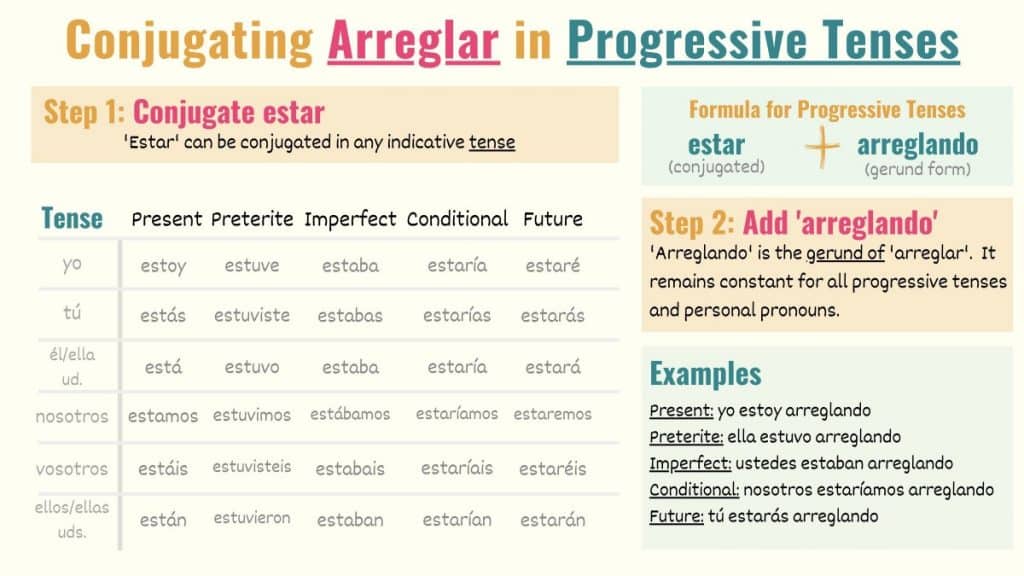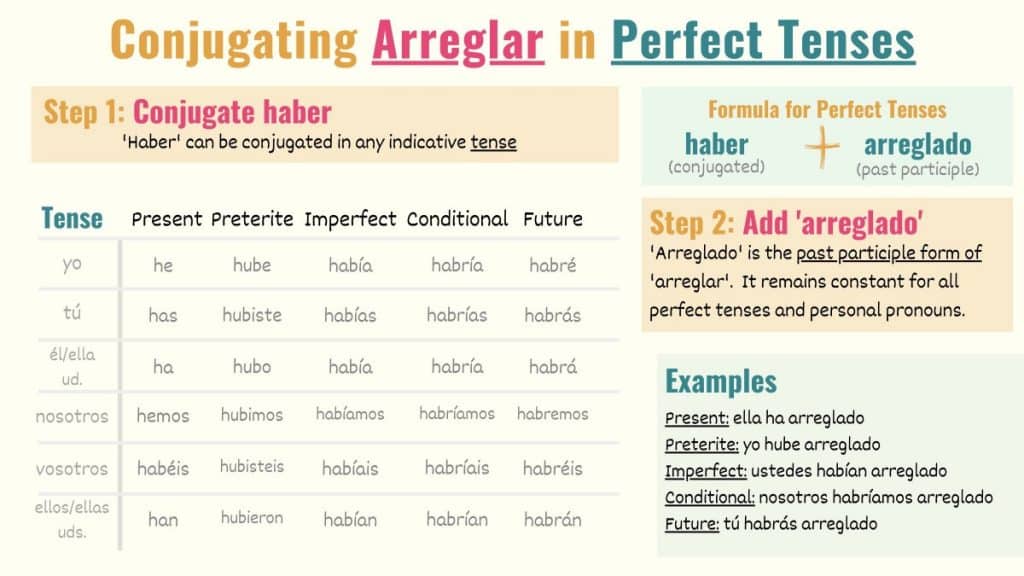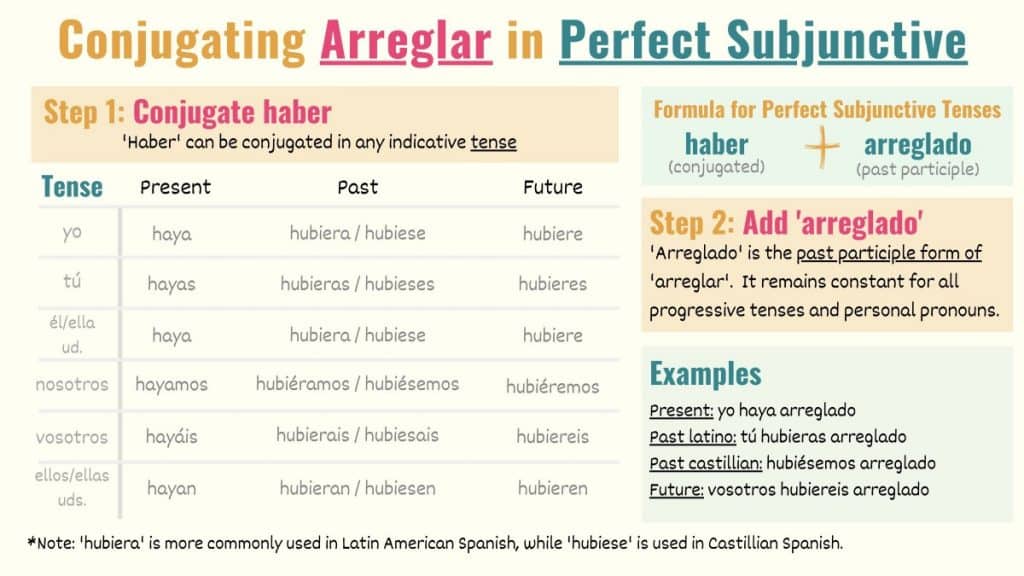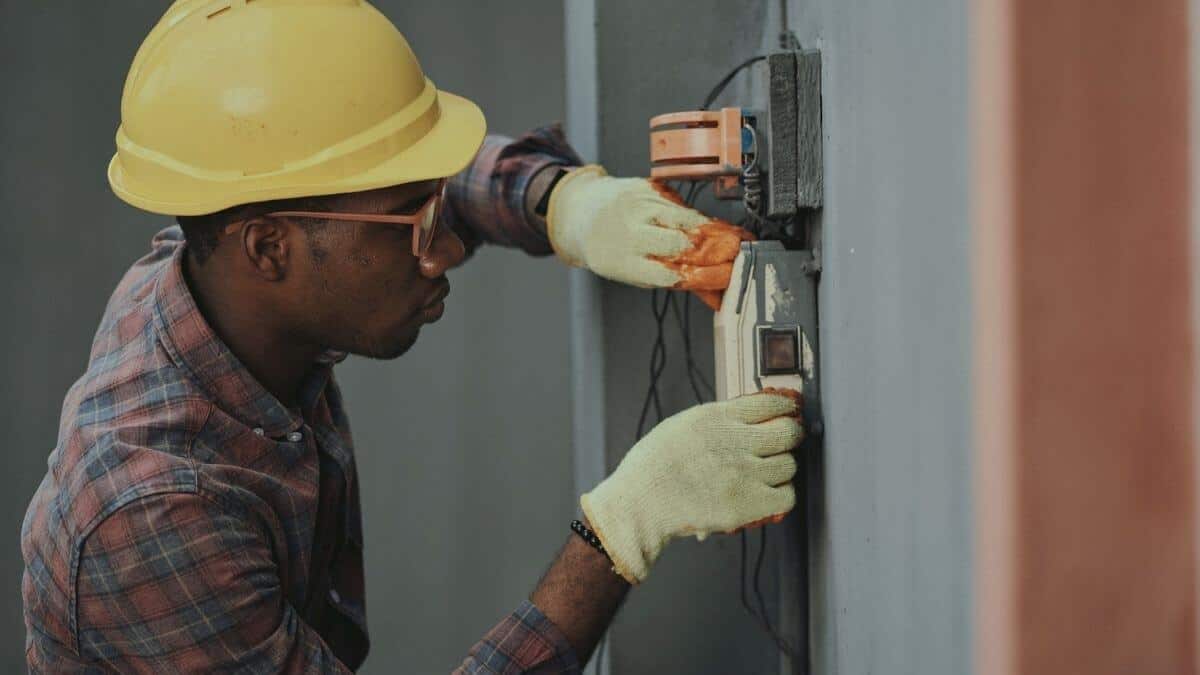In this short guide, we will cover the following topics for ‘Arreglar’ in Spanish:
- What does ‘Arreglar’ mean?
- ‘Arreglar’ Conjugations
- How to Use ‘Arreglar’ in Spanish
- Expressions & Idioms with ‘Arreglar’
- Synonyms of ‘Arreglar’ in Spanish
What does ‘Arreglar’ mean?
Definition – Arreglar means to fix, to resolve, or to sort out. Therefore, in Spanish, this verb is used to express the idea of repairing something or resolving a certain situation. Additionally, when applied to people, ‘arreglar’ expresses that someone is getting ready or is tidying something up.
- If describing that someone is resolving or fixing something, ‘arreglar’ means ‘to fix’, ‘to resolve’, ‘to repair’ or ‘to sort out’.
- When talking about someone getting ready for an event or an appointment, ‘arreglar’ can be translated as ‘to get ready’, ‘to primp’ or ‘to groom oneself’.
- If referring to organizing places or spaces, ‘arreglar’ means ‘to clean up, ‘to tidy up’ or ‘to put in order’.
‘Arreglar’ Conjugations
In Spanish, ‘arreglar’ is a regular verb. This means that the stem arregl will remain the same when conjugating and only a different ending will be added for each subject and tense.
Keep in mind that, in some contexts, you’ll need to use its reflexive form arreglarse, which means that you’ll need to add a reflexive pronoun to the conjugations shown in the tables below.
Indicative
Present tense conjugation
| Person | Conjugation | Translation |
|---|---|---|
| Yo | Arreglo | I fix |
| Tú | Arreglas | You fix |
| Él / Ella / Usted | Arregla | He/She fixes |
| Nosotros | Arreglamos | We fix |
| Vosotros | Arregláis | You fix |
| Ustedes / Ellos / Ellas | Arreglan | They/You fix |
Preterite tense conjugation
| Person | Conjugation | Translation |
|---|---|---|
| Yo | Arreglé | I fixed |
| Tú | Arreglaste | You fixed |
| Él / Ella / Usted | Arregló | He/She fixed |
| Nosotros | Arreglamos | We fixed |
| Vosotros | Arreglaisteis | You fixed |
| Ustedes / Ellos / Ellas | Arreglaron | They/You fixed |
Imperfect tense conjugation
| Person | Conjugation | Translation |
|---|---|---|
| Yo | Arreglaba | I fixed |
| Tú | Arreglabas | You fixed |
| Él / Ella / Usted | Arreglaba | He/She fixed |
| Nosotros | Arreglábamos | We fixed |
| Vosotros | Arreglabais | You fixed |
| Ustedes / Ellos / Ellas | Arreglaban | They/You fixed |
Future tense conjugation
To conjugate arreglar in the future tense you just need to add the corresponding endings to the infinitive verb.
| Person | Conjugation | Translation |
|---|---|---|
| Yo | Arreglaré | I will fix |
| Tú | Arreglarás | You will fix |
| Él / Ella / Usted | Arreglarás | He/She will fix |
| Nosotros | Arreglaremos | We will fix |
| Vosotros | Arreglaréis | You will fix |
| Ustedes / Ellos / Ellas | Arreglarán | They/You will fix |
Conditional tense conjugation
| Person | Conjugation | Translation |
|---|---|---|
| Yo | Arreglaría | I would fix |
| Tú | Arreglarías | You would fix |
| Él / Ella / Usted | Arreglaría | He/She would fix |
| Nosotros | Arreglaríamos | We would fix |
| Vosotros | Arreglaríais | You would fix |
| Ustedes / Ellos / Ellas | Arreglarían | They/You would fix |
Progressive Tenses

Ellie y Fernanda están arreglando sus vestidos.
Ellie and Fernanda are repairing their dresses.
Si mañana hace buen tiempo, arreglaré el techo.
If the weather is nice tomorrow, I’ll fix the ceiling.
Perfect Tenses

Espérame, todavía no me he arreglado.
Wait, I haven’t got ready.
Charly me dijo que ya habían arreglado las tuberías.
Charlie told me that they had already fixed the pipes.
Arreglar Subjunctive Conjugations
Present subjunctive conjugation
| Person | Conjugation | Translation |
|---|---|---|
| Yo | Arregle | To fix |
| Tú | Arregles | To fix |
| Él / Ella / Usted | Arregle | To fix |
| Nosotros | Arreglemos | To fix |
| Vosotros | Arregléis | To fix |
| Ustedes / Ellos / Ellas | Arreglen | To fix |
Imperfect subjunctive conjugations
| Person | Conjugation | Translation |
|---|---|---|
| Yo | Arreglara / Arreglase | I fixed |
| Tú | Arreglararas / Arreglases | You fixed |
| Él / Ella / Usted | Arreglara / Arreglase | He/She fixed |
| Nosotros | Arregláramos Arreglásemos | We fixed |
| Vosotros | Arreglarais / Arreglaseis | You fixed |
| Ustedes / Ellos / Ellas | Arreglaran / Arreglasen | They/You fixed |
Perfect subjunctive

Si hubieras arreglado el carro, no habríamos tenido problemas.
If you had fixed the car, we wouldn’t have had any issues.
Ojalá hayas arreglado la sala.
I hope you have put the living room in order.
Imperative
Imperative conjugation
| Person | Conjugations | Translations |
|---|---|---|
| Tú | Arregla | Fix |
| Nosotros | Arreglemos | Let’s fix |
| Vosotros | Arreglad | Fix |
| Ustedes | Arreglen | Fix |
[‘Arreglar’ in imperative] + [complement]
¡Arregla tu cuarto, se ve horrible!
Clean up your room, it looks awful!
¡No sé cómo le van a hacer, pero arreglen este problems!
I don’t know how you’re going to do it, but fix this problem!
The negative imperative tense works differently than positive imperative. Instead, we use the present subjunctive to build sentences using the structure below:
No + [‘arreglar’ in present subjunctive] + [complement]
Oye, no arregles aquí, tu hermano va a limpiar.
Hey, do not tidy up here, your brother is going to clean.
No se arreglen todavía, su papá va a llegar tarde.
Don’t clean yourself up just yet, your dad is going to be late.
How to Use ‘Arreglar’ in Spanish with Examples
There are three main ways to use the verb ‘arreglar’ in Spanish:
- Using ‘arreglar’ to talk about fixing stuff
- Talking about getting ready
- Talking about tidying up
In the next sections I’ll show you examples and the way that sentences should be structured so you have a better understanding of how to use this verb in conversations.
Talking about fixing or resolving something
As mentioned earlier, in Spanish, ‘arreglar’ is most commonly used to talk about fixing, repairing or resolving something. As a result, this verb is often used when talking about repairing objects or problems.
[‘Arreglar’ conjugated] + [definite article] + [noun]
El fontanero arregló las tuberías.
The plumber fixed the pipes.
Si supiera cómo, arreglaría el refrigerador yo misma.
If I knew how, I would fix the fridge myself.
¿Arreglaste el reloj que estaba descompuesto?
Did you fix the clock that was broken?
No te preocupes, ya arreglaremos el problema con las reservaciones.
Don’t worry, we’ll resolve the problem with the reservations.
Describing that someone is getting ready
When used in its reflexive form (arreglarse), this verb can be used to describe that someone is getting dressed up or grooming themselves for an event or an appointment. So, in this context, arreglarse means ‘to get ready’, ‘to primp’ or ‘to groom oneself’.
Notice that in order to use this verb, you can use two different phrase structures depending on how many verbs you want to include in your sentence.
[Verb conjugated] + [‘arreglar’ in infinitive form] + [reflexive pronoun]
Necesito arreglarme para mi entrevista de trabajo.
I need to get ready for my job interview.
Mi novia tarda horas para arreglarse.
My girlfriend takes hours to get ready.
[‘Arreglar’ conjugated] + [complement]
¡Arréglate ya! Se nos va a hacer tarde.
Get ready now! We’re going to be late.
Sebastián y Luke se están arreglando para la fiesta.
Sebastian and Luke are grooming themselves for the party.
Take Note: Remember that when working with a reflexive verb you can place the pronoun either at the end of the verb in infinitive form (previous examples) or before the first conjugated verb (see the examples below).
[Reflexive pronoun] + [verb conjugated] + [reflexive verb infinitive]
Me voy a arreglar para la fiesta.
I’m going to get dressed up for the party.
¿Nos vamos a arreglar en tu casa?
Are we going to get dressed up at your house?
Related Resource: How to Conjugate Reflexive Verbs in Spanish
Talking about tidying up
Another common use of ‘arreglar’ in Spanish is to talk about organizing or tidying up places or spaces, such as a room, a desk, a bag or a house. In this context, ‘arreglar’ is translated as ‘to tidy up’, ‘to clean up’ or ‘to put in order’.
[‘Arreglar’ conjugated] + [determiner] + [noun]
Ya arreglé mi cuarto.
I already tidied up my room.
Arreglemos la casa antes de que llegue mi mamá.
Let’s tidy up the house before my mom arrives.
¡Arreglen este desastre!
Clean up this mess!
Arreglar Expressions & Idioms
There are other ways in which you can use ‘arreglar’ in your daily conversations. Here are the most popular ones:
Arreglar cuentas: This expression can be translated as ’to settle accounts’ and is used to talk about paying a debt. When used in a figurative sense it means that someone is bringing an end to a disagreement with another person. In these cases, it can be translated as ‘to sort things out’ or ‘to settle the score’.
Arreglar las cosas: This is a very common expression in Spanish and is used to express that a person solved or is planning to resolve a conflict with someone else. It can be translated as ‘to settle things’ or ‘put things in order’.
Arreglar una situación: This expression is very similar to ‘arreglar las cosas’, but it could be applied to more formal contexts. ‘Arreglar una situación’ means ‘to take care of a situation’ or ‘to deal with a situation’.
Synonyms of ‘Arreglar’ in Spanish
Resolver: It means to find an answer or a solution to a problem. As a result, it can be a synonym of ‘arreglar’ when talking about fixing or solving a situation. ‘Resolver’ means ‘to solve’ or ‘to resolve’.
Ordenar: It means ‘to put things in order’. When used as a synonym of ‘arreglar’ it can be used to talk about organizing and tidying up.
Ajustar: This can be translated as ‘to adjust’. Since it refers to adjusting something to get a desired result, it can be used instead of ‘arreglar’ when we talk about things like clothes or accessories (adjusting a tie, a watch, a shirt, etc).
Reparar: In Spanish, reparar is a more formal way to describe that an object or situation is being fixed. This verb is the direct translation of ‘to repair’, but it can also be translated as ‘to fix’ or ‘to correct’.



